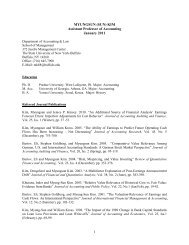zara technology: go to market strategy - University at Buffalo School ...
zara technology: go to market strategy - University at Buffalo School ...
zara technology: go to market strategy - University at Buffalo School ...
You also want an ePaper? Increase the reach of your titles
YUMPU automatically turns print PDFs into web optimized ePapers that Google loves.
4.48 million as estim<strong>at</strong>ed by 2005 census. It is a multiracial city st<strong>at</strong>e with a majority<br />
popul<strong>at</strong>ion of Chinese with substantial Malay and Tamil Indian minorities.<br />
The country is a parliamentary republic where a Prime Minister is the head of the<br />
<strong>go</strong>vernment. It has a multiparty system and an independent judiciary. Since its<br />
inception, Singapore has been lead by People’s Action Party (PAP). Government<br />
bureaucracy is managed by n<strong>at</strong>ional Civil Service. A hallmark of <strong>go</strong>od <strong>go</strong>vernance by<br />
PAP has been relentless focus on service <strong>to</strong> the various constituencies and an uncorrupt<br />
bureaucracy. This has spanned in<strong>to</strong> a large bureaucracy organized <strong>to</strong> serve individual<br />
constituencies within business community and citizenry <strong>at</strong> large. The Civil Service seeks<br />
<strong>to</strong> <strong>at</strong>tract the best and brightest in the country <strong>to</strong> serve the public <strong>at</strong> a salary benchmarked<br />
with the priv<strong>at</strong>e sec<strong>to</strong>r. Leadership is required <strong>to</strong> clearly enunci<strong>at</strong>e the agenda and<br />
measure outcomes as they believe appropri<strong>at</strong>e. In terms of accountability, any criticism<br />
of the bureaucracy, particularly in media, is vi<strong>go</strong>rously defended. Leadership in civil<br />
service is regularly rot<strong>at</strong>ed <strong>to</strong> infuse new blood and prevent possible encroachment of<br />
corruption as a result of longevity of leadership in a decision making position. The Wall<br />
Street Journal and The Heritage Found<strong>at</strong>ion, Washing<strong>to</strong>n’s preeminent think tank, have<br />
for over a decade tracked the march of economic freedom around the world with their<br />
influential Index of Economic Freedom. Singapore ranks 5th out of 158 countries in their<br />
Corruption Perceptions Index for 2005.<br />
Rel<strong>at</strong>ionship with Business<br />
Singapore Government is generally considered <strong>to</strong> be pro-business, in a unique<br />
partnership with them. One senior Civil servant has <strong>go</strong>ne so far as <strong>to</strong> describe business as<br />
<strong>go</strong>vernment’s “cus<strong>to</strong>mer.” Following the recommend<strong>at</strong>ions of the United N<strong>at</strong>ion’s<br />
Development Committee, in 1961 the Ministry of Trade and Industry (MITI) established<br />
the Economic Development Board (EBD) <strong>to</strong> foster economic growth in the country. It<br />
has served as “one s<strong>to</strong>p shop” for intern<strong>at</strong>ional inves<strong>to</strong>rs. EBD has been very successful<br />
in its mission. Singapore is home <strong>to</strong> 3,000 multin<strong>at</strong>ional corpor<strong>at</strong>ions (MNCs) from the<br />
United St<strong>at</strong>es, Japan, and Europe engaged in almost all sec<strong>to</strong>rs of the economy. They<br />
account for more than two-thirds of manufacturing output and direct export sales,<br />
although certain services sec<strong>to</strong>rs remain domin<strong>at</strong>ed by <strong>go</strong>vernment-linked corpor<strong>at</strong>ions.<br />
Despite its small size, Singapore is now the tenth-largest trading partner of the United<br />
St<strong>at</strong>es.<br />
Rewards of Government’s pro-business policies have been spectacular. Although<br />
Singapore’s economy is small by global standards, it is a rel<strong>at</strong>ively rich country. In 2006,<br />
Singapore’s GDP was US$141 billion with a per capita GNP of US $31,400. The per<br />
capita GDP of the tiny island n<strong>at</strong>ion equals th<strong>at</strong> of the four largest European countries<br />
and is five times th<strong>at</strong> of its nearest neighbor, Malaysia. Singapore’s economy grew <strong>at</strong> the<br />
7.9% in 2006. In the face of increasing global competition, Singapore continues <strong>to</strong> build<br />
on its core advantages--a <strong>go</strong>od geographical loc<strong>at</strong>ion, developed infrastructure, a <strong>go</strong>od<br />
communic<strong>at</strong>ions system, political stability and a disciplined workforce--while always<br />
looking <strong>to</strong> develop new economic strengths.<br />
22


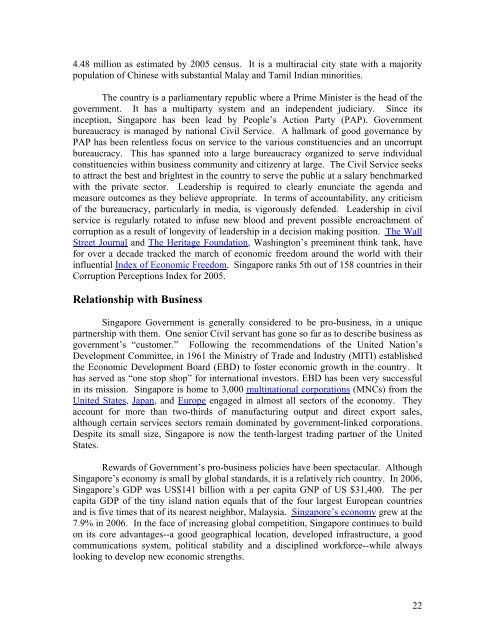
![Glossary of Action Verbs [PDF]](https://img.yumpu.com/50452890/1/190x245/glossary-of-action-verbs-pdf.jpg?quality=85)
![Download Brochure [PDF] - University at Buffalo School of ...](https://img.yumpu.com/46723301/1/184x260/download-brochure-pdf-university-at-buffalo-school-of-.jpg?quality=85)

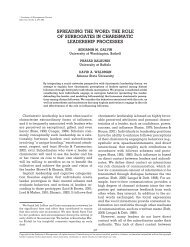

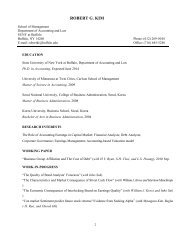

![CRC Newsletter [PDF] - University at Buffalo School of Management](https://img.yumpu.com/34736697/1/190x245/crc-newsletter-pdf-university-at-buffalo-school-of-management.jpg?quality=85)
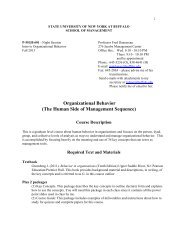

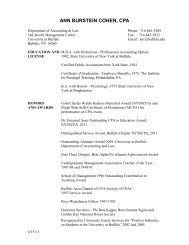
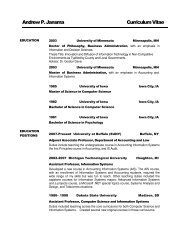

![Program [PDF] - University at Buffalo School of Management](https://img.yumpu.com/24102928/1/190x190/program-pdf-university-at-buffalo-school-of-management.jpg?quality=85)
